
 As we stated in a previous blog post, Lifting Slabs in Cold Weather, there are plenty of jobs that need to be done in the winter. This is just as true for sealing leaks as it is for slab lifting. So let's take a look at those cold weather leak seal markets. We'll also review some special considerations for conditioning leak seal material and equipment. Then we’ll leave you with a few cold temperature leak seal application tips.
As we stated in a previous blog post, Lifting Slabs in Cold Weather, there are plenty of jobs that need to be done in the winter. This is just as true for sealing leaks as it is for slab lifting. So let's take a look at those cold weather leak seal markets. We'll also review some special considerations for conditioning leak seal material and equipment. Then we’ll leave you with a few cold temperature leak seal application tips.
Cold Weather Markets
You have a variety of options for seeking jobs that are inside, out of the elements, during the winter months. Hopefully these ideas will spark more brainstorming on your part. First up we have tunnels, both pedestrian and vehicle. Tunnels often leak, sometimes significantly enough to result in quite a big job. Aquariums are another possibility. As you can imagine, there are infinite potential leak problems in a structure holding that much water. Other possible large jobs could include mines and water treatment plants (which have plenty of interior spaces with potential leak issues). On the smaller side, there are utility vaults, lift stations, manholes and elevator pits.
If you’re still up for working outside during the winter months, you’re in luck because concrete contracts during colder weather. The contraction makes cracks open wider. Wider cracks make leaks more apparent to the property owner and make them easier to repair.
Conditioning Materials and Equipment
One important point to understand is that cold weather requires you to make an extra effort to keep your materials and equipment warm. Cold material reacts slower and gets thicker. Be sure to store your materials and equipment in a heated room the night before the job. When on the jobsite, there are many ways to keep everything warm. Use an enclosed vehicle, like a box truck, enclosed trailer or pickup truck with a camper top or bed cover. Keep as much material and equipment inside the vehicle as possible when working. Use a portable heater to maintain a warm temperature. You can also use electric pail heaters to keep your resin ready for action.
Remember that it won’t do you any good to heat the resin if you’re pumping it through cold equipment. The cold steel inside the pump and the cold hose will literally suck the heat out of the resin before it gets where it needs to be. This will increase the viscosity, making it harder to mix with the water and it will slow down the reaction dramatically. So don’t neglect the equipment side of the equation!
Cold Temperature Application Tips
If you’re using a product with an accelerator, you may need to use a faster accelerator or increase your percentage. Also, bring lots of oakum. You may have to use more if the cold temperature slows down the material or the contracted concrete has made the cracks wider.
If your job requires you to inject into a structure underwater (and the water’s cold), you can use a technique called twin streaming. In this approach, you hook two valves together in parallel fashion – then inject warm water along with the resin to kick start it reacting before hitting the cold water.
Conclusion
I hope this overview has helped spark some ideas on your part for finding leak seal work during the winter months. Just remember to keep your materials and equipment conditioned and you should be fine. Have more questions about polyurethane leak seal in cold weather? Call us at 404-618-0438.
Editor's Note: This post was originally published in 2019 as Polyurethane Leak Seal in Cold Weather.
Want more in-depth info on polyurethane Leak Seal®?

 Single-Component Geotech Pump Skid
Single-Component Geotech Pump Skid



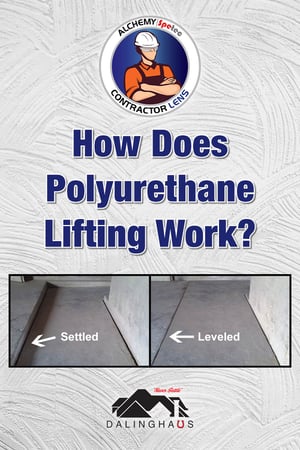 This post is part of the Alchemy-Spetec
This post is part of the Alchemy-Spetec

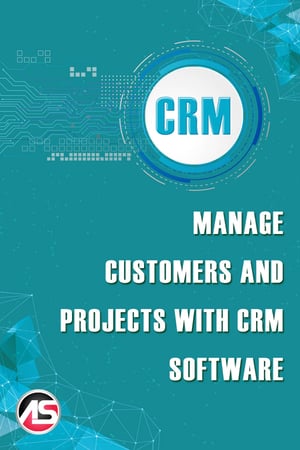 As the Inside Sales Manager for Alchemy-Spetec, I am responsible for keeping our lead, customer, and project data in order. Our busy sales and marketing team needs to access this information quickly and accurately. Precise, contextual, and quick accessibility of these systems gives our team a powerful, painless, and rapid advantage over our competitors that are stuck using outdated technology and processes.
As the Inside Sales Manager for Alchemy-Spetec, I am responsible for keeping our lead, customer, and project data in order. Our busy sales and marketing team needs to access this information quickly and accurately. Precise, contextual, and quick accessibility of these systems gives our team a powerful, painless, and rapid advantage over our competitors that are stuck using outdated technology and processes.


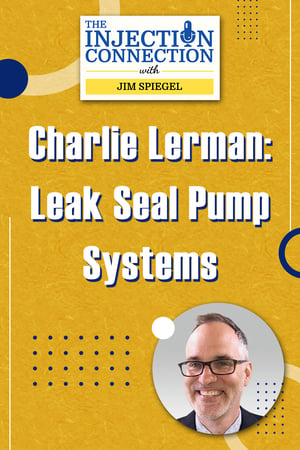 This article is an excerpt from
This article is an excerpt from 
 We understand that chemical grouting is often not the primary focus of a construction or repair job, but a water leak can often bring the rest of the job to a screeching halt until it is sealed. Job costs then start to pile up, production or facility services stay shut down as time drags on, sometimes tempers begin to flare. Sound familiar?
We understand that chemical grouting is often not the primary focus of a construction or repair job, but a water leak can often bring the rest of the job to a screeching halt until it is sealed. Job costs then start to pile up, production or facility services stay shut down as time drags on, sometimes tempers begin to flare. Sound familiar?
 I often get asked about pre-drilling for crack injection. Pre-drilling is the practice of putting all the ports in position before injecting anything. This preparation procedure can often be very time efficient. Think of this an assembly line approach. Pre-drilling is often done when there is “shut-down” period on a job with a limited time to get the work done. You’ll encounter these types of jobs in subway systems, for example, when the work needs to be done while the trains aren’t running. That’s just one specific example, but you get the idea.
I often get asked about pre-drilling for crack injection. Pre-drilling is the practice of putting all the ports in position before injecting anything. This preparation procedure can often be very time efficient. Think of this an assembly line approach. Pre-drilling is often done when there is “shut-down” period on a job with a limited time to get the work done. You’ll encounter these types of jobs in subway systems, for example, when the work needs to be done while the trains aren’t running. That’s just one specific example, but you get the idea.

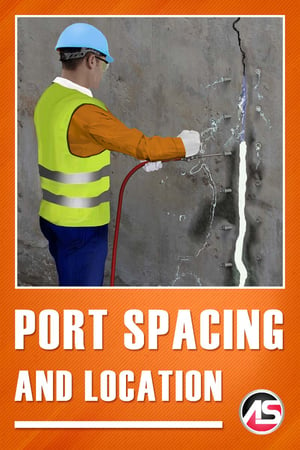 Port spacing in the case of crack injection has nothing to do with the distance between a port in Miami and a port in Jamaica. In this case, we are simply discussing how far apart to place your injection ports. This is not a fixed distance, as proper port spacing varies depending on site conditions.
Port spacing in the case of crack injection has nothing to do with the distance between a port in Miami and a port in Jamaica. In this case, we are simply discussing how far apart to place your injection ports. This is not a fixed distance, as proper port spacing varies depending on site conditions.
 This article is an excerpt from
This article is an excerpt from 
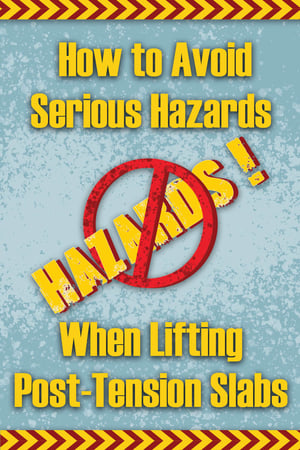

 As we stated in a previous blog post,
As we stated in a previous blog post,